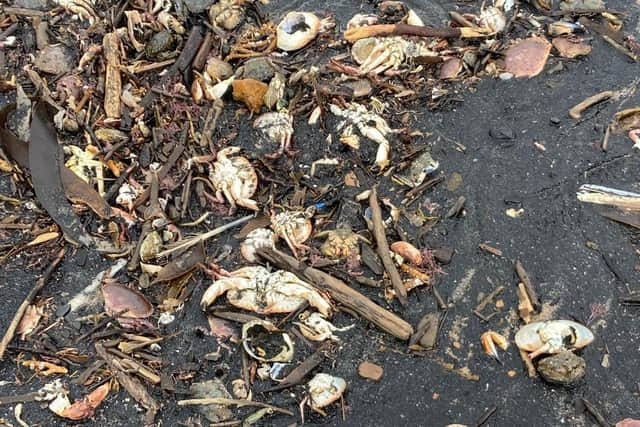Tees Estuary marine deaths: Sewage and underwater cables ruled out as cause of crab and lobster deaths after test results come back
Thousands of dead crabs, lobsters and other shellfish have washed up on beaches in Hartlepool, Redcar and Saltburn since the start of October and the Environment Agency launched a major investigation, fearing a mystery pollution incident was behind the deaths.
Yet laboratory testing of some of the sealife and of the water has found nothing amiss.


Advertisement
Hide AdAdvertisement
Hide AdScientists even say that a natural event could still be responsible for the phenomenon - though seismic activity is not being considered.
A new underwater cable to transport electricity between Northumberland and Norway was also the subject of speculation - yet the tests have ruled out its involvement too.
An Environment Agency statement released on Thursday read: "The investigation is a top priority for laboratories at the Environment Agency and Centre for Environment, Fisheries and Aquaculture Science, who are completing a series of highly complex tests to identify whether any contaminants or signs of disease can be identified in samples of water, crab and sediment
"The likelihood of the deaths being caused by sewage, seismic activity or underwater cables have been ruled out as the investigation progresses
Advertisement
Hide AdAdvertisement
Hide Ad"Environmental experts and scientists from a number of organisations have joined forces to investigate why thousands of dead and dying crabs and lobsters have washed up along the coast in Teesside and neighbouring areas.
"The Environment Agency, the Centre for Environment, Fisheries and Aquaculture Science (Cefas), North Eastern Inshore Fisheries and Conservation Authority (NEIFCA), the Marine Management Organisation (MMO), Hartlepool Borough Council and Redcar and Cleveland Borough Council are collaborating on the investigation.
"Samples of water, mussel, crab and sediment are being analysed at labs across the UK to determine whether a pollutant or animal disease could have contributed to the deaths of the marine crustaceans, or if it was a natural event."
Senior marine monitoring officer Hannah Westoby added: "We understand how distressing the sight of dead and dying marine life is on our beaches, so this investigation is a top priority for Environment Agency and Cefas laboratories.
Advertisement
Hide AdAdvertisement
Hide Ad"The Environment Agency is investigating whether a pollution incident could have contributed to the deaths of the crustaceans and Cefas is investigating for signs of disease.
"The tests being carried out by our labs are extremely complex and have to be undertaken in steps. We’re analysing samples of water, sediment and crab for traces of hundreds of potential contaminants, so it is taking time to work through all of the possibilities. We’re continuing to collect further samples while we await the results.
"Our investigations have managed to rule out the likelihood of a number of possible causes, including sewage, seismic activity and underwater cables. Results for our water samples have come back as normal for those locations. There is always the possibility that this was a natural event, so we are keeping an open mind.
"We have found no evidence that there is a risk to human health, but we would urge beach users to exercise caution while our investigation continues. Avoid affected areas of beach and coastline where possible and make sure you wash your hands thoroughly with soap and water after coming into contact with any affected crustaceans. Do not touch any sick or dead crustaceans and keep pets away from them too."
Advertisement
Hide AdAdvertisement
Hide AdFish Health Inspectorate head Mike Gubbins said: "We are investigating whether an aquatic animal disease has caused this mortality. Our Fish Health Inspectorate have been analysing shellfish samples collected from the area for listed and other non-listed diseases, but none have been detected so far.
“We will continue to work with partner agencies to try and find answers for the local community.”
Anyone who finds dead crustaceans (crabs or lobsters) or other dead wildlife, should report them to the Environment Agency on 0800 80 70 60.
